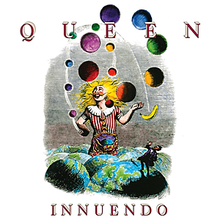Innuendo (album)
| Innuendo | ||||
|---|---|---|---|---|
 |
||||
| Studio album by Queen | ||||
| Released | 5 February 1991 | |||
| Recorded | March 1989 – November 1990 | |||
| Studio |
|
|||
| Genre | Rock | |||
| Length | 53:44 | |||
| Label |
|
|||
| Producer |
|
|||
| Queen chronology | ||||
|
||||
| Singles from Innuendo | ||||
|
||||
| Professional ratings | |
|---|---|
| Review scores | |
| Source | Rating |
| Allmusic | |
| Rolling Stone | |
| The Times | (unfavourable) |
| The Orlando Sentinel | (favourable) |
| The Cincinnati Post | |
| Los Angeles Times | (mixed) |
| San Francisco Chronicle | (unfavourable) |
| St. Petersburg Times | |
| St. Louis Post-Dispatch | (unfavourable) |
| Entertainment Weekly | (C-) |
Innuendo is the fourteenth studio album by the British rock band Queen, released on 5 February 1991. Produced by David Richards and the band, it was the band's final studio album to be released in Freddie Mercury's lifetime and also their last to be composed entirely of new material. It reached the number-one spot on the UK album charts and stayed at that position for two weeks, and also peaked at number-one in Italy, the Netherlands, Germany, Switzerland, staying at number-one for three weeks, four weeks, six weeks, and eight weeks, respectively. It was the first Queen album to go gold in the US upon its release since The Works in 1984.
The album was recorded between March 1989 and November 1990. In the spring of 1987, Mercury was diagnosed with AIDS, although he kept his illness a secret from the public and denied countless media reports that he was seriously ill. The band and producers were aiming for a November or December release date in order to catch the crucial Christmas market, but Mercury's declining health meant that the release of the album did not take place until February 1991. Stylistically, Innuendo is in some sense a return to Queen's roots, with its harder rock sound, complex musical composition (title track), psychedelic effects ("I'm Going Slightly Mad"), and somewhat weakened vocals from Mercury ranging over four octaves. Nine months after the album was released, Mercury died of bronchial pneumonia resulting from his AIDS.
The album cover was designed by Queen and Richard Gray. The booklets and single covers from the album are by Grandville, or are inspired by his illustrations. Innuendo was voted the 94th greatest album of all time in a national 2006 BBC poll.
Queen released their thirteenth album, The Miracle, in May 1989, but unlike their previous albums, they did not conduct a live tour. Freddie Mercury conducted an interview with BBC Radio 1, where he said that he wanted to break from the "album – tour – album – tour" routine. During this time, he was diagnosed with AIDS (having been diagnosed as HIV positive in 1987), which was not yet publicised and was only known to the rest of the band; however, rumours had been spreading since 1988 about Mercury's health and of the possibility that he had the disease, with speculation about his health being fuelled by a clear physical decline in his appearance, particularly weight loss. While he kept quiet due to his personal rule not to talk to the media, the other band members denied the rumours; at one point, band member Roger Taylor told reporters that "he is healthy and working". In 1990, Queen won the Brit Award for Outstanding Contribution to British Music. While Mercury accepted the award for the band at the Dominion Theatre, Brian May spoke for the band. Mercury's increasingly gaunt appearance at the ceremony sparked further speculation from the public about his health, which persisted throughout 1990. The 1990 BRIT Awards would be Mercury's final public appearance.
...
Wikipedia
